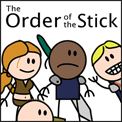Raph Koster pointed out this article on BBC News, entitled "Computer game to boost key skills" (emphasis mine):
Computer science teachers at West Nottinghamshire College were struggling to get their teenage students into literacy and numeracy classes.
So they took apart Atari's popular computer game Neverwinter Nights and rebuilt it with educational challenges the player must meet to progress.
Success rates in key skills at the Mansfield college has trebled to 94%.
[Nigel Oldman, one of the people who helped transform the game into a learning tool] said: "The little Herberts had realised that not attending their literacy and numeracy key skills classes was not going to affect their vocational qualifications."
"We would be flushing them out of the canteen, chasing them all over the place and they would just say: 'we did literacy and numeracy at school and we've never had to use it since'.
"We were struggling and we had had enough - so we decided we needed something that would attract them."
... [So,] "We ripped the game apart and rebuilt it to deliver educational content," he added.
Players are invited to pick a character and go on a quest in which they have to make decisions about what to take and how to progress using mathematics and their literacy skills.
Mr. Oldman explained: "For example, before they set off in their galleon they have to fill it with the things they are going to need. This requires them to work out the area of the ship and how much they can manage to bring.
"Some students managed it, others sank on the way and never progressed to the next level.
"They would come knocking on the staff room door and wouldn't let us go until we had taught them how to calculate area."
While this particular incidence may be unusually effective and not necessarily indicative of the power of edu-tainment in general, as anecdotal evidence, this is huge.
Educators often talk about a lack of motivation being one of the biggest obstacles to teaching. And games, after all, are nothing more than organized systems of incentives: if you want to "win the game", then you have to follow the rules. As Mr. Koster himself maintains, all games are educational. The reason they're compelling to the player is because he wants to figure it out, so he can get that feeling of triumph when he masters the system, beats his friend, unlocks the final level.
What I think is most interesting about this point is that it illustrates a number of key factors in maintaining the fun of a game while still achieving an educational goal. The way I see it, the Neverwinter Nights edu-mod succeeded because its creators made certain specific design choices.
First, this was a game the required math to advance. It was not a "math game". Many "educational" games are simply boring games wrapped around a series of math problems. There's not much fun in that. If the game itself is not compelling; if you finish the game and don't say "let's play again!" then it's just not a fun game, and its usefulness as an incentivizing factor disappears. The game in the article was based on a highly successful and well-polished, mass-market video game and then tailored to better suit an educational purpose.
Second, the educational goal of the mod's creators was achieved by putting it on a critical path to the in-game goals. Or, put another way, the story provided some goal (say, that the hero cross an ocean with all of the stuff he needs), and the player needed to use his math skills to figure out how to accomplish it (by figuring out the area of the ship's deck). The in-game goal was compelling enough to incentivize the player to perform this other task. From an in-game perspective, the math itself was a secondary goal, even though this was the designers' purpose all along.
I think this is a fascinating story. It would be interesting to determine whether other examples of particularly successful educational games follow this formula, as well. Please post suggestions in the comments if you know of any.
Labels: Education, Raph Koster

 RSS
RSS

